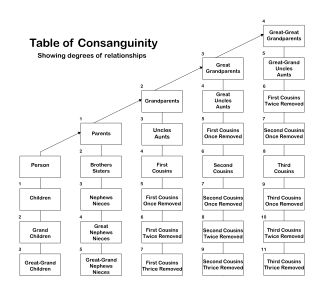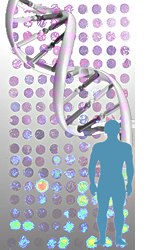Related Research Articles

Genetics is the study of genes, genetic variation, and heredity in organisms. It is an important branch in biology because heredity is vital to organisms' evolution. Gregor Mendel, a Moravian Augustinian friar working in the 19th century in Brno, was the first to study genetics scientifically. Mendel studied "trait inheritance", patterns in the way traits are handed down from parents to offspring over time. He observed that organisms inherit traits by way of discrete "units of inheritance". This term, still used today, is a somewhat ambiguous definition of what is referred to as a gene.

A genetic disorder is a health problem caused by one or more abnormalities in the genome. It can be caused by a mutation in a single gene (monogenic) or multiple genes (polygenic) or by a chromosomal abnormality. Although polygenic disorders are the most common, the term is mostly used when discussing disorders with a single genetic cause, either in a gene or chromosome. The mutation responsible can occur spontaneously before embryonic development, or it can be inherited from two parents who are carriers of a faulty gene or from a parent with the disorder. When the genetic disorder is inherited from one or both parents, it is also classified as a hereditary disease. Some disorders are caused by a mutation on the X chromosome and have X-linked inheritance. Very few disorders are inherited on the Y chromosome or mitochondrial DNA.
The genotype of an organism is its complete set of genetic material. Genotype can also be used to refer to the alleles or variants an individual carries in a particular gene or genetic location. The number of alleles an individual can have in a specific gene depends on the number of copies of each chromosome found in that species, also referred to as ploidy. In diploid species like humans, two full sets of chromosomes are present, meaning each individual has two alleles for any given gene. If both alleles are the same, the genotype is referred to as homozygous. If the alleles are different, the genotype is referred to as heterozygous.

Heredity, also called inheritance or biological inheritance, is the passing on of traits from parents to their offspring; either through asexual reproduction or sexual reproduction, the offspring cells or organisms acquire the genetic information of their parents. Through heredity, variations between individuals can accumulate and cause species to evolve by natural selection. The study of heredity in biology is genetics.
Discussions of race and intelligence – specifically, claims of differences in intelligence along racial lines – have appeared in both popular science and academic research since the modern concept of race was first introduced. With the inception of IQ testing in the early 20th century, differences in average test performance between racial groups were observed, though these differences have fluctuated and in many cases steadily decreased over time. Complicating the issue, modern science has shown race to be a socially constructed phenomenon rather than a biological reality, and there are various conflicting definitions of intelligence. In particular, the validity of IQ testing as a metric for human intelligence is disputed. Today, the scientific consensus is that genetics does not explain differences in IQ test performance between groups, and that observed differences are environmental in origin.

Genetic variation is the difference in DNA among individuals or the differences between populations among the same species. The multiple sources of genetic variation include mutation and genetic recombination. Mutations are the ultimate sources of genetic variation, but other mechanisms, such as genetic drift, contribute to it, as well.

Consanguinity is the characteristic of having a kinship with a relative who is descended from a common ancestor.
Genetic genealogy is the use of genealogical DNA tests, i.e., DNA profiling and DNA testing, in combination with traditional genealogical methods, to infer genetic relationships between individuals. This application of genetics came to be used by family historians in the 21st century, as DNA tests became affordable. The tests have been promoted by amateur groups, such as surname study groups or regional genealogical groups, as well as research projects such as the Genographic Project.

Human genetics is the study of inheritance as it occurs in human beings. Human genetics encompasses a variety of overlapping fields including: classical genetics, cytogenetics, molecular genetics, biochemical genetics, genomics, population genetics, developmental genetics, clinical genetics, and genetic counseling.
Hereditarianism is the doctrine or school of thought that heredity plays a significant role in determining human nature and character traits, such as intelligence and personality. Hereditarians believe in the power of genetics to explain human character traits and solve human social and political problems. Hereditarians adopt the view that an understanding of human evolution can extend the understanding of human nature.
Research on the heritability of IQ inquires into the degree of variation in IQ within a population that is due to genetic variation between individuals in that population. There has been significant controversy in the academic community about the heritability of IQ since research on the issue began in the late nineteenth century. Intelligence in the normal range is a polygenic trait, meaning that it is influenced by more than one gene, and in the case of intelligence at least 500 genes. Further, explaining the similarity in IQ of closely related persons requires careful study because environmental factors may be correlated with genetic factors.

Robert Joseph Plomin is an American/British psychologist and geneticist best known for his work in twin studies and behavior genetics. A Review of General Psychology survey, published in 2002, ranked Plomin as the 71st most cited psychologist of the 20th century. He is the author of several books on genetics and psychology.
Gene–environment correlation is said to occur when exposure to environmental conditions depends on an individual's genotype.
Genetic epidemiology is the study of the role of genetic factors in determining health and disease in families and in populations, and the interplay of such genetic factors with environmental factors. Genetic epidemiology seeks to derive a statistical and quantitative analysis of how genetics work in large groups.
Behavioural genetics, also referred to as behaviour genetics, is a field of scientific research that uses genetic methods to investigate the nature and origins of individual differences in behaviour. While the name "behavioural genetics" connotes a focus on genetic influences, the field broadly investigates the extent to which genetic and environmental factors influence individual differences, and the development of research designs that can remove the confounding of genes and environment. Behavioural genetics was founded as a scientific discipline by Francis Galton in the late 19th century, only to be discredited through association with eugenics movements before and during World War II. In the latter half of the 20th century, the field saw renewed prominence with research on inheritance of behaviour and mental illness in humans, as well as research on genetically informative model organisms through selective breeding and crosses. In the late 20th and early 21st centuries, technological advances in molecular genetics made it possible to measure and modify the genome directly. This led to major advances in model organism research and in human studies, leading to new scientific discoveries.
The missing heritability problem is the fact that single genetic variations cannot account for much of the heritability of diseases, behaviors, and other phenotypes. This is a problem that has significant implications for medicine, since a person's susceptibility to disease may depend more on the combined effect of all the genes in the background than on the disease genes in the foreground, or the role of genes may have been severely overestimated.
Genoeconomics is an interdisciplinary field ofprotoscience that aims to combine molecular genetics and economics.
The relationship between intelligence and education is one that scientists have been studying for years.
Benjamin Michael Neale is a statistical geneticist with a specialty in psychiatric genetics. He is an institute member at the Broad Institute as well as an associate professor at both Harvard Medical School and the Analytic and Translational Genetics Unit at Massachusetts General Hospital. Neale specializes in genome-wide association studies (GWAS). He was responsible for the data analysis of the first GWAS on attention-deficit/hyperactivity-disorder, and he developed new analysis software such as PLINK, which allows for whole-genome data to be analyzed for specific gene markers. Related to his work on GWAS, Neale is the lead of the ADHD psychiatric genetics and also a member of the Psychiatric GWAS Consortium analysis committee.
The infinitesimal model, also known as the polygenic model, is a widely used statistical model in quantitative genetics and in genome-wide association studies. Originally developed in 1918 by Ronald Fisher, it is based on the idea that variation in a quantitative trait is influenced by an infinitely large number of genes, each of which makes an infinitely small (infinitesimal) contribution to the phenotype, as well as by environmental factors. In "The Correlation between Relatives on the Supposition of Mendelian Inheritance", the original 1918 paper introducing the model, Fisher showed that if a trait is polygenic, "then the random sampling of alleles at each gene produces a continuous, normally distributed phenotype in the population". However, the model does not necessarily imply that the trait must be normally distributed, only that its genetic component will be so around the average of that of the individual's parents. The model served to reconcile Mendelian genetics with the continuous distribution of quantitative traits documented by Francis Galton.
References
- ↑ "Augustine Kong". Oxford Big Data Institute. Retrieved 2019-06-20.
- ↑ "Augustine Kong, PhD". New York Genome Center. Retrieved 2019-06-20.
- ↑ "Educational attainment, 2002". doi:10.1787/458681287213 . Retrieved 2023-07-03.
{{cite journal}}: Cite journal requires|journal=(help) - ↑ Zimmer, Carl (2018-01-25). "You Are Shaped by the Genes You Inherit. And Maybe by Those You Don't". The New York Times. ISSN 0362-4331 . Retrieved 2019-06-20.
- ↑ Chen, Angela (2018-01-25). "Here's how you're influenced by the genes you didn't inherit from your parents". The Verge. Retrieved 2019-06-20.